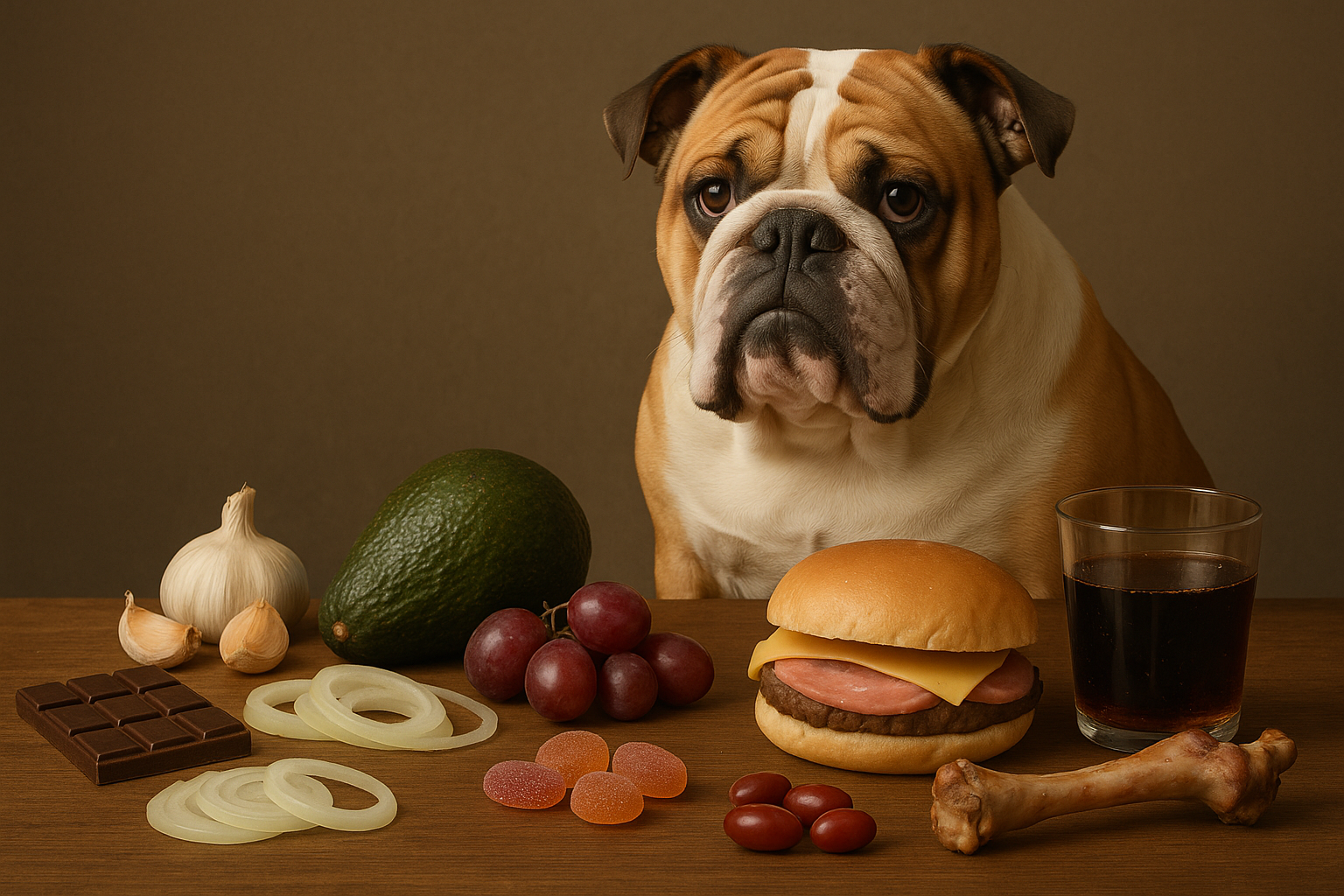Taking care of your bulldog’s diet is one of the most important decisions to keep their health in balance. This breed is especially prone to digestive issues, food allergies, and obesity, which makes it even more important to be cautious about what they eat. While many owners are used to sharing food with their dogs or offering a “little bite” of something, the truth is that not everything that’s safe for humans is safe for dogs. In fact, some common foods can be dangerous or even deadly for your bulldog. Knowing which foods are off-limits is essential to avoid veterinary emergencies and keep your companion healthy.
One of the most toxic and well-known foods is chocolate. It contains theobromine, a substance that dogs cannot metabolize properly. In bulldogs, even small amounts of chocolate can cause vomiting, diarrhea, rapid heart rate, muscle tremors, seizures, and in severe cases, death. The darker and purer the chocolate, the more toxic it is. No matter how sweetly your bulldog looks at you while you’re eating a piece of chocolate—never share it.
Another highly dangerous group includes onions and garlic, whether raw, cooked, powdered, or dried. Both contain compounds that damage dogs’ red blood cells, leading to hemolytic anemia. This condition can be severe and may require transfusions or prolonged treatment. What’s tricky is that many homemade dishes or processed foods contain onion or garlic as seasonings, so it’s essential to read labels and avoid giving your dog human leftovers.
Grapes and raisins are also on the list of foods to avoid completely. While the exact reason for their toxicity is still not fully understood, even small amounts can cause acute kidney failure in dogs. Some dogs may react after just a few grapes, while others seem unaffected, but the risk is high and unpredictable, making them too dangerous to risk.
Avocado, despite being healthy for humans, is not necessarily safe for dogs. It contains persin, a toxin that can cause vomiting, diarrhea, and stomach discomfort. In addition, the pit poses a serious choking hazard or risk of intestinal blockage if the bulldog tries to chew it or swallows it accidentally. While not all dogs react the same way, bulldogs tend to have more sensitive digestive systems, so it’s best not to include avocado in their diet.
Another major risk comes from caffeinated products, such as coffee, tea, energy drinks, soda, and certain medications. Caffeine stimulates the nervous system and heart. If a bulldog consumes caffeine, it can lead to hyperactivity, excessive panting, irregular heartbeat, muscle tremors, and in extreme cases, collapse or seizures. While it may seem obvious, many accidents happen when owners leave a coffee cup within the dog’s reach.
Cooked bones, although traditional, can be dangerous for bulldogs. Unlike raw bones, cooked bones can splinter easily, causing cuts in the mouth or esophagus and potentially leading to intestinal perforation. Some bulldogs also try to swallow large chunks without chewing, which can cause choking or intestinal blockage. If you want to give a bone, choose a large, raw bone under supervision, or better yet, opt for chew products designed specifically for dogs.
Even in small amounts, alcohol is extremely toxic to dogs. This includes alcoholic beverages and also fermenting dough, such as raw bread or pizza dough, which can produce alcohol in the dog’s stomach during digestion. Alcohol effects include loss of coordination, disorientation, vomiting, diarrhea, slowed heart rate, depression of the central nervous system, and in some cases, coma or death. Any accidental ingestion should be treated as an emergency.
Another ingredient that’s gained notoriety is xylitol, a sugar substitute found in many “sugar-free” products such as gum, candies, baked goods, toothpaste, and some medications. In dogs, xylitol causes a rapid release of insulin, leading to a dangerous drop in blood sugar (hypoglycemia), seizures, and liver damage. In bulldogs, even tiny doses can trigger severe reactions, so completely avoid products containing xylitol.
Processed meats like ham, sausages, or bologna should also be avoided. They’re high in saturated fats, sodium, preservatives, and other additives that can cause digestive issues, pancreatitis, and contribute to weight gain. The same goes for fried foods, heavily seasoned meals, or oily dishes. Bulldogs are prone to obesity and gastrointestinal problems, so their diet should be as natural and balanced as possible.
Dairy products can also cause issues for many bulldogs. While some tolerate small amounts of yogurt or cheese, many are lactose intolerant, leading to gas, diarrhea, vomiting, or stomach discomfort. If you choose to offer dairy as an occasional treat, make sure it’s sugar-free, additive-free, and monitor your dog’s reaction before repeating.
Finally, it’s important to mention table scraps. While it might feel like an act of love to give your bulldog a bite of your food, this habit can lead to obesity, poor eating behavior, and accidental exposure to dangerous ingredients. The safest approach is to establish a specific diet for your bulldog, based on foods formulated for their breed and health condition, and use healthy treats instead of leftovers.
In conclusion, feeding your bulldog properly requires knowledge, commitment, and responsibility. Some dietary mistakes may seem minor at the time but can lead to serious long-term consequences. Avoiding dangerous foods, offering a balanced diet, and consulting your vet whenever you’re unsure is the best way to ensure your bulldog enjoys a long, healthy, and happy life. Prevention is the best medicine—and it starts with what you put in their bowl every day.
